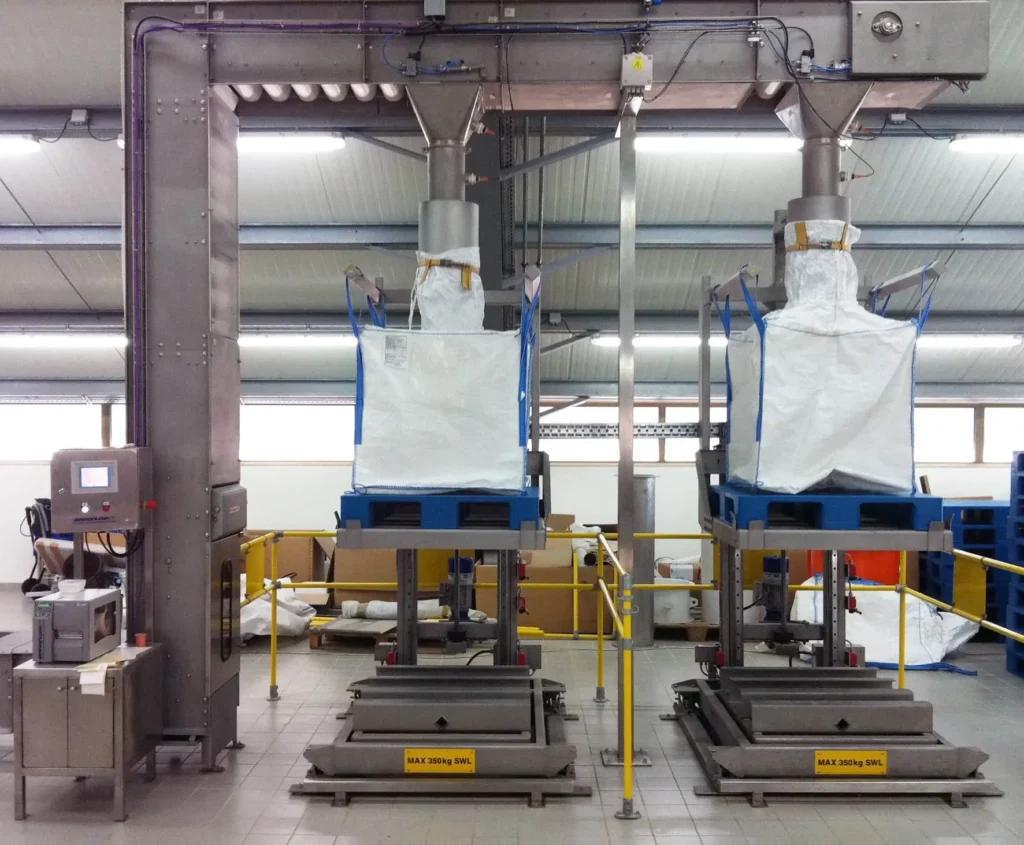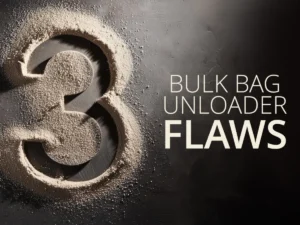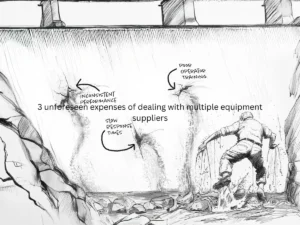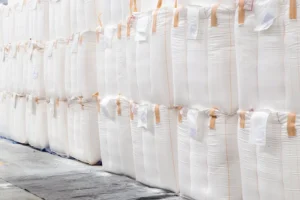At Spiroflow, we field numerous daily inquiries from customers seeking the ideal bulk bag filler for their specific needs. A common query that runs through their minds is, “How much does a bulk bag filler cost?” To shed light on this question, we’ve prepared a comprehensive guide that delves into the various factors influencing the price and provides insight into the available options.
How Much Does a Bulk Bag Filler Cost?
When it comes to setting the price of a bulk bag filler, there are many factors that can impact the final price. However, you can expect a basic bulk bag filler to cost in the range of $10,000 (£7,000). The most sophisticated bulk bag fillers can cost as much as $120,000 (£92,500). These high-end bulk bag fillers deliver high-volume, high-speed bulk bag filling at 30-35 bags/hour! Spiroflow can provide a free quote.
Decoding Bulk Bag Filler Costs – Unraveling the Price Puzzle
Having provided bulk bag fillers to customers around the world for over 45 years, we understand how frustrating it can be to get an answer to the cost question. To be fair, finding such an answer online can be very difficult. This is primarily because there are so many factors that can influence the final price of a bulk bag filler.
Understanding all of your requirements is vital in order to provide the safest and most efficient bulk bag-filling system possible. To help you figure out what you might be expected to pay for a bulk bag filler, we’re going to go over a variety of questions.
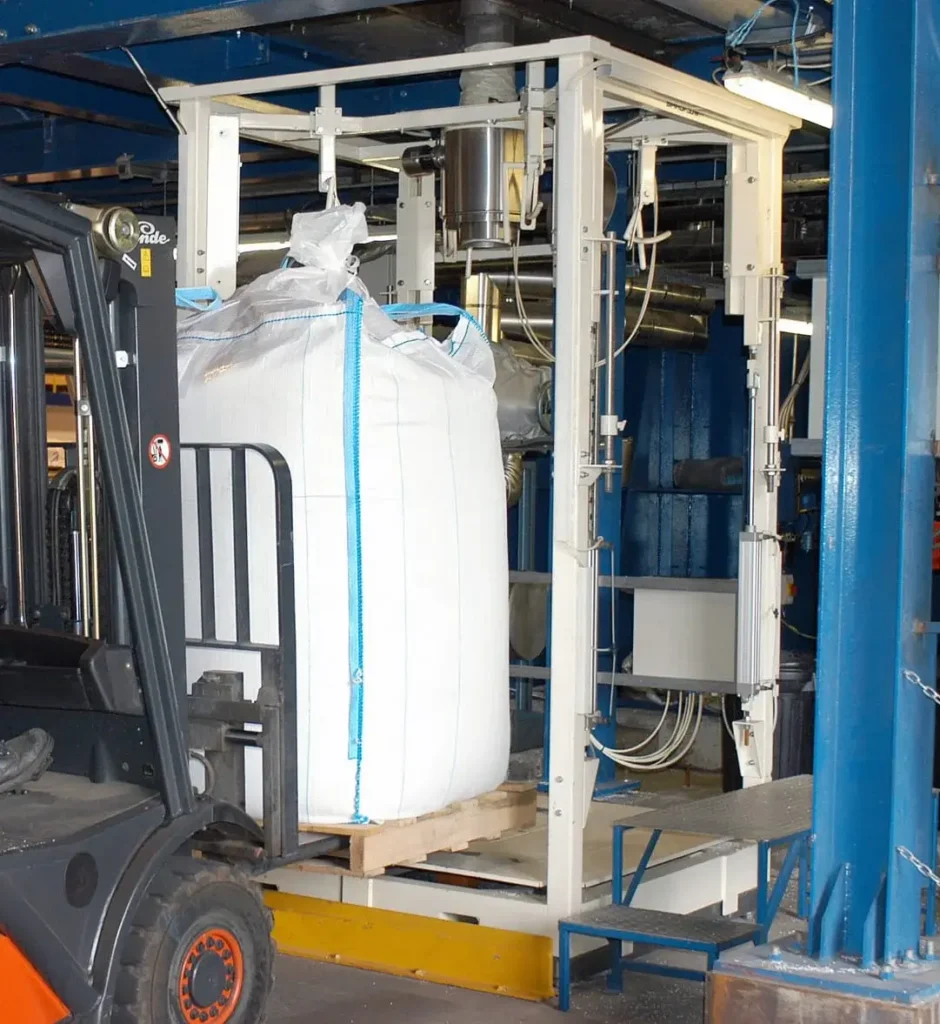
What Should You Expect From the Right Bulk Bag Filling System?
When it comes to investing in a bulk bag-filling system, knowing what to expect from the right solution is essential. A well-designed and efficient bulk bag-filling system should deliver a multitude of benefits, ensuring safety, precision, and flexibility in your material handling processes.
This being said, here are the key features and considerations to have in mind when choosing the ideal bulk bag-filling system, ensuring it meets and even exceeds your expectations:
- A safe, robust, and ergonomic design,
- Dust-free bulk bag filling and total containment of your material,
- Accurate weighing (if filling by weight),
- Meet or exceed your required filling rates,
- Material densification if your material is easily aerated,
- Design modifications to meet your layout restrictions,
- Flexibility to fill various-sized bulk bags, boxes/octabins, rigid bins/totes,
- Semi-automatic systems and controls for optimal automation.
There are several bulk bag filler designs to choose from, plus a variety of options – which will affect the price. They are built to fit your unique requirements. Whether it is a combination of our existing filler designs and options or a custom design, we need to understand your requirements in detail. And by the way, know that a custom doesn’t necessarily translate to expensive.
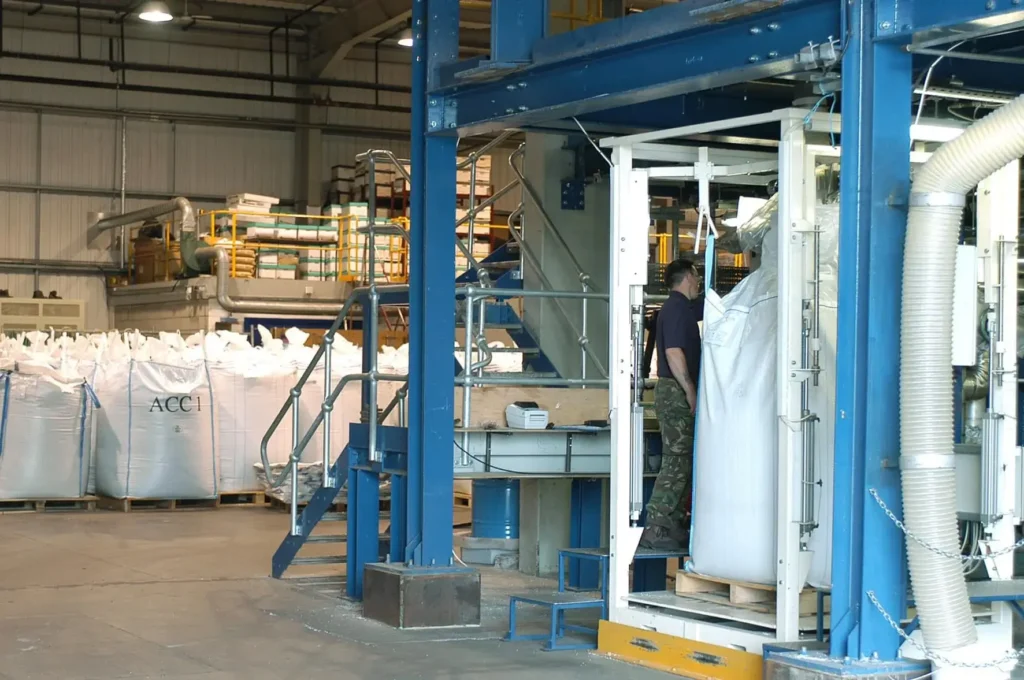
What Are Your Bulk Bag Handling Requirements?
Bulk bag fillers are designed for you. Ensure you answer the following questions and help us narrow down the right filling options for your process:
- Are you filling by volume or weight?
- How will you remove filled bulk bags?
- Will you handle the bulk bag on a pallet, by their loops, or utilize a flexible screw conveyor or other solutions? If you are removing the filled bags by a pallet, will you use a forklift or pallet truck?
- What bag styles and sizes do you use? Do you have varying bag heights? If so, you will need a bulk bag filler with an automatic height adjustment feature.
- Would you like to automate your bulk bag-filling process?
- Will you be filling anything other than a bulk bag? Boxes, drums, or rigid bins? If so, you will want a box, drum, and rigid bin-filling attachment.
- Do you need to stack the filled bulk bags? Stacking bulk bags can save on warehousing costs.
- Do your bulk bags have liners?
What Are the Characteristics of Your Material?
As one of the top-notch belt conveyor manufacturers, it’s important that we completely understand all the materials you handle. It’ll help determine the bulk bag-filling options needed for your application. Here are some of the questions you should answer to ease the whole process:
- What are all the materials you are filling the bags with?
- What is the bulk density of each material?
- What form is your material – granular, pellet, powder, flake, fiber, or something else?
- What is the particle size of your material?
- What is the temperature of your material?
- Is your material very free-flowing, free-flowing, semi-free-flowing, or non-free-flowing?
- Does your material bridge or rat hole?
- What are the characteristics of your material? Is it cohesive, abrasive, friable, dusty, hazardous, toxic, corrosive, flammable, or explosive? Does it pack, or does it aerate? Is it hygroscopic?
- What is the liquid content of your material? How much water, fat, or oil is in your material?
- Is your product highly aerated?
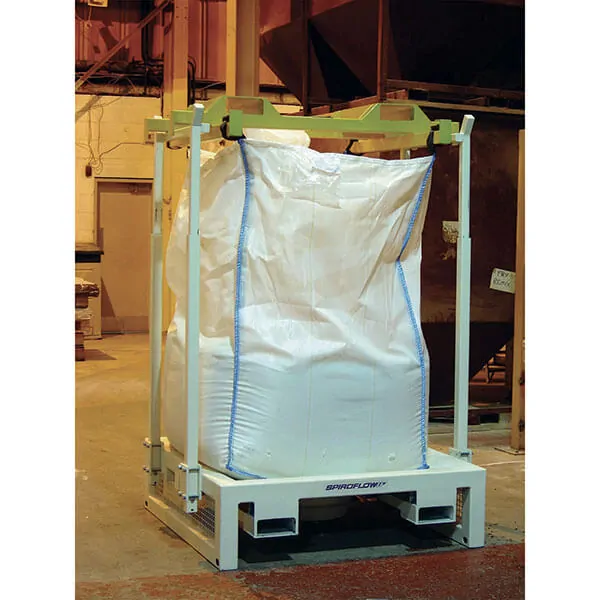
What Are Your Bulk Bag Handling Needs and Limitations?
Once we know what kind of bulk bag filler you need, we need to know more about where the filler will go. Learning more about what belt conveyor system you use, your layout, and more about your process will help us fine-tune your machine. Let’s go over the following questions:
- What are the dimensions – the length, height, width, spout length, and spout width?
- What is the filling source – a conveyor belt system, a hopper, or something else?
- Are you filling by weight or volume?
- What is the weight of the filled bulk bag?
- How much time is required to fill a bulk bag?
- How many bags/hour need to be filled?
- If weighing, what weighing accuracy is required?
- Is valve control required?
- Are there headroom limitations?
- Will filled bulk bags be removed by an integral roller conveyor, forklift, or pallet truck?
- Do you need the bulk bag filler to be mobile?
What Are Your Equipment Specifications?
We understand that equipment specifications are different for everyone. These questions will help manufacturers design your perfect filler:
- What finish specification is required for the support frame and non-contact surfaces?
- What finish specification is required for material contact surfaces?
- What are your electrical requirements? Standard NEMA 4 (ATEX) or explosion-proof?
- What motor class do you require (Class/Div/Group)?
- What power is available on site (Volt/Phase/Hz)?
What Are Your Bulk Bag Filling Requirements?
These questions about your bulk bag filling requirements are not only essential for addressing your needs but also serve as vital inputs for our engineers to determine the most suitable system, whether it involves conveyor belt systems or tubular industrial conveyor systems.
- How many bags/hour do you want to fill?
- Do you have low or high-volume filling requirements?
- Do you want your bulk bag filler system automated with controls?
- What upstream equipment will deliver material to the bulk bag filler?
- What type of filling valve is required?
- Light-duty or heavy-duty use?
- Do you require an access platform?
- Do you require a complete semi-automated system?
What Options Are of Interest?
Conveyor systems manufacturers offer options or add-ons that could help your process move more effectively. Take a look at this list. Feel free to ask about any of the items listed.
- Seismic zone four load cells,
- Vibration,
- Deaeration,
- Access platform,
- Weigh batch controller,
- Weight display,
- Fill control valve,
- Pneumatic bag neck seal,
- Bag liner inflation,
- Motorized or gravity roller conveyor technologies,
- Take away roller conveyor belt solutions,
- Automatic or manual bag loop release,
- Sampling port,
- Drum/Box/Tote filler attachment,
- Gain-in-weight load cells,
- Fill the nozzle with a dust extraction vent,
- Mobile base.
Spiroflow Will Lead Your Path to Seamless Material Handling Solutions
Whether you’re exploring the world of conveyor manufacturers or seeking reliable conveyor belts, Spiroflow has you covered. Our extensive experience in solving bulk bag-filling challenges has earned us a global reputation for excellence. If you require advice or wish to discuss a project, we’re here to help you find the perfect solution. Contact us today and let Spiroflow be your trusted partner in material handling innovation.

